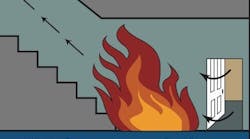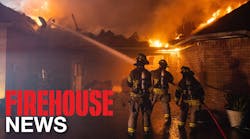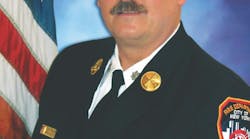It's not easy to find silver linings in the wreckage left by Katrina and Rita but, if nothing else, the back-to-back hurricanes exposed critical flaws in the nation's disaster preparedness. Some were weaknesses that the fire-rescue service had been pointing out for many years, but could not get anyone to pay attention. Now, in the aftermath of a catastrophic disaster, it appears that Congress and government officials may be willing to listen to good advice and actually take some action.
One example is the long-running battle between public safety forces and commercial interests over the allocation of new spectrum for emergency communications. Last month, after eight years of intense lobbying, committee reports, hearings and delaying tactics, the House and Senate Commerce Committees drafted legislation that would make available 24 megahertz in the 700 MHz range that previously had been designated for fire, police and other emergency services. Most amazing, there seems to be a sense of urgency on Capitol Hill, with congressional leaders making an effort to pass the bills before adjourning for their annual Thanksgiving-Christmas vacations.
If this legislation does pass, it will double the spectrum currently allocated to public safety. Along with making more frequencies available to fire and police departments, the added spectrum will provide clearer and more effective communications. The limitations and outright failures of emergency radio have been an on-going problem in many disasters and it happened again in the Gulf Coast hurricanes. However, this time it seems to have had an impact and comes at a time when the federal government needs more sources of revenue to deal with its expanding budget deficit.
In order to free up the public safety channels, Congress first has to set a date for the broadcasting industry to switch television transmissions from analog to digital technology so they can vacate the 700 MHz band. The Federal Communications Commission proposed Dec. 31, 2006, as the cut-off date, but the broadcasters insist that was merely "a target" and not a firm deadline. The spectrum issue raises all kinds of complicated problems that have to be solved at every step. It also involves billions of dollars the federal government stands to earn from the sale of spectrum channels to private industry for various high-tech enterprises. Current and would-be users also have huge financial stakes in how the channels are allocated.
As this is written, the immediate and highest hurdle is setting a firm deadline for the mandatory change from analog to digital. The draft of the Senate bill sets the date as April 7, 2009; the House version would make the deadline three months earlier, on Dec. 31, 2008. (Ever sensitive to public opinion, the Senate Commerce Committee apparently is concerned about interfering with TV viewers watching the New Year's holiday football games and the NCAA basketball tournament.) Once the bills are passed, the committees' leaders will meet to come up with a date both chambers can agree upon. It's called "reconciliation" and it can be a tricky process, but fire service congressional watchers are hoping it will happen this month.
"What we're looking for is a hard date," says Alan Caldwell, vice president for government affairs for the International Association of Fire Chiefs. Congress literally has to force the broadcasters off the channels that have been set aside for public safety. "Once that happens, we can start using the channels that were allocated to us," Caldwell explains. It has been a long, hard struggle in which the fire-rescue service and police organizations have stood shoulder-to-shoulder and presented a united front that rarely has been seen on any other issue. As Caldwell describes it: "We've engaged in the heaviest battle we've ever waged to get this legislation passed."
If it leads to better, more dependable emergency communications, it will be well worth the effort. But the radio problem and the battle over spectrum is only one of many problems that have gone unsolved for many years and contributed to the many things that went wrong in response to the hurricanes. Some things went right, but as we learn more of what happened day-by-day, it seems that mistakes made in previous disasters were repeated all along the Gulf Coast. As is the case is most fatal fires, there are not many new lessons to be learned from Katrina and Rita, but there are plenty of old lessons that were not heeded.
Hopefully, officials at all levels of government, who have the power and the responsibility to solve these problems, will listen, learn and finally take the proper actions.
Hal Bruno, a Firehouse contributing editor, retired as political director for ABC News in Washington and served almost 40 years as a volunteer firefighter. He is a director of the Chevy Chase, MD, Fire Department and chairman of the National Fallen Firefighters Foundation.





